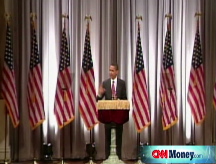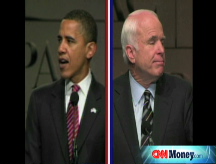Cap gains tax: How high can Obama go?
The candidate faces a tough question: How much can he raise long-term investment tax without sacrificing the revenue - and political support - he needs to fund his programs?
NEW YORK (CNNMoney.com) -- Barack Obama has made one part of his plan for the capital gains tax perfectly clear: He wants to raise the rate above 15% for high-income investors.
But to what level: 20%? 23%? 27%? All Obama has said is that it would be at least 20% and less than 28%.
The choice the presumptive Democratic nominee for president makes will matter to investors and to federal coffers. It's one of the many crucial tax details he and his advisers have yet to settle as they campaign against Republican rival John McCain.
One reason Obama says he wants to raise the rate is to establish more fairness in the tax system. A low rate directly benefits high-income taxpayers the most since they hold more taxable investments than everyone else.
Yet Obama is also banking on revenue from a higher capital gains rate to help pay for some of his proposals, such as new tax cuts for less-than-flush families and a system to make health insurance affordable for all.
"What I want is not oppressive taxation. I want businesses to thrive," he said in a Democratic presidential debate this spring.
So Obama knows he can't afford to raise the tax so high that it stifles investment and the free flow of capital. But where's that magic dividing line, above which he risks losing needed revenue and creating economic distortions in investor behavior?
"They've been debating this question for at least 70 years," said tax historian Joseph Thorndike.
Any change in capital gains rates can create a short-term boost in revenue since investors are more inclined to sell before a rate increase or soon after a rate decrease. But the long-term effects on revenue are more of a question mark.
Bob Carroll, a former Treasury official and now vice president for economic policy at the Tax Foundation, which favors a flat tax, said some research shows that somewhere between 26% and 28% is the level up to which the capital gains tax could increase revenue. But even at those levels, Carroll said, "there'd be significantly negative economic consequences."
By that he means: the higher the rate, the longer investors are likely to hold onto their investments and the more likely it is their decision to sell or invest in a company will be based on the tax consequences rather than on the merit of the investment itself.
On the other hand, Tax Policy Center Director Len Burman, also a former Treasury official and author of the book "The Labyrinth of Capital Gains Tax Policy - A Guide for the Perplexed," has done research suggesting that raising the capital gains rate even above 28% might not hurt revenue or create much negative distortion in investor behavior.
Theoretically, the capital gains tax "is the easiest tax in the world to avoid - simply don't sell your assets," he said. "But in the real world, there's lots of selling. ... [Either] people don't pay that much attention to taxes, or they think they can beat the market so selling is worth the tax. In any event, my research suggests that capital gains are way less responsive to taxes than one might think."
So, if Obama is looking for scientific clarity, he won't get it. "There's no empirically determinable bright line around this," said Clint Stretch, managing principal of tax policy at Deloitte Tax.
Obama himself has virtually said that 20% to 25% is the real range he's considering. "I talk to people like Warren Buffett or others and I ask them ... how much of a difference is it going to be if it's 20 or 25 percent. They say, look, if it's within that range then it's not going to distort, I think, economic decision-making," he said in a CNBC interview.
And Obama occasionally makes it sound like he's really aiming for the lowest end of that range, telling Fox News, "in terms of capital gains I've suggested we might go back up to 20 [percent]."
Maybe that's the political pragmatist talking. At the end of the day, "it's going to come down to politics," Stretch said. And since many Democrats along with Republicans back the idea that lower rates encourage investment, the politics suggests he won't be able to raise the tax above 25% and may not be able to get it much above 20% - where it's scheduled under current law to be by 2011 unless lawmakers decide otherwise.
Ultimately, Stretch said, "There's what Obama wants to do, and then there's what he can get past Congress." ![]()




